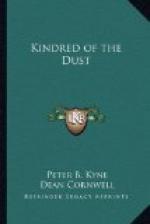“Hush! It’s all of that and then some. I’m a man grown beyond the puppy-love stage, my dear—and the McKayes are not an impulsive race. We count the costs carefully and take careful note of the potential profits. And while I could grant my people the right to make hash of my happiness I must, for some inexplicable reason, deny them the privilege of doing it with yours. I think I can make you happy, Nan; not so happy, perhaps, that the shadow of your sorrow will not fall across your life occasionally, but so much happier than you are at present that the experiment seems worth trying, even at the expense of sacrificing the worldly pride of my people.”
“Are you entertaining a strong hope that after you marry me, dear, your people will forgive you, make the best of what they consider a bad bargain and acknowledge me after a fashion? Do you think they will let bygones be bygones and take me to their hearts—for your sake?”
“I entertain no such silly illusion. Under no circumstances will they ever acknowledge you after a fashion, for the very sufficient reason that the opportunity to be martyrs will never be accorded my mother and sisters by yours truly, Donald McKaye, late Laird apparent of Port Agnew. Bless, your sweet soul, Nan, I have some pride, you know. I wouldn’t permit them to tolerate you. I prefer open warfare every time.”
“Have you broken with your people, dear?”
“Yes, but they do not know it yet. I didn’t have the heart to raise a scene, so I merely gave the old pater a hug, kissed mother and the girls and came away. I’m not going back.”
“You will—if I refuse to marry you?”
“I do not anticipate such a refusal. However, it Hoes not enter into the matter at all in so far as my decision to quit The Dreamerie is concerned. I’m through! Listen, Nan. I could win my father to you—win him wholeheartedly and without reservation—if I should inform him that my mother asked you to come back to Port Agnew. My mother and the girls have not told him of this and I suspect they have encouraged his assumption that Andrew Daney took matters in his own hands. Father has not cared to inquire into the matter, anyhow, because he is secretly grateful to Daney (as he thinks) for disobeying him. Mother and the girls are forcing Daney to protect them; they are using his loyalty to the family as a club to keep him in line. With that club they forced him to come to you with a proposition that must have been repugnant to him, if for no other reason than that he knew my father would not countenance it. When you told him you would marry me if I should ask you again, to whom did Daney report? To Elizabeth, of course—the brains of the opposition. That proves to me that my father had nothing to do with it—why the story is as easily understood from deduction as if I had heard the details from their lips. But I cannot use my mother’s peace of mind as a club to beat dad into line; I cannot tell him something that will almost make him hate mother and my sisters; I would not force him to do that which he does not desire to do because it is the kindly, sensible and humane course. So I shall sit tight and say nothing—and by the way, I love you more than ever for keeping this affair from me. So few women are true blue sports, I’m afraid.”




